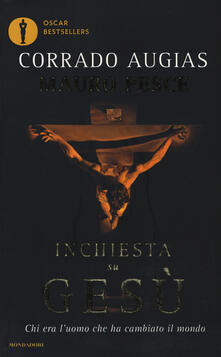 (This book is Italian only) If you, like me, grew up in a traditional Catholic environment, as it could be anywhere in Italy, or, to a lesser extent in France or Spain, then chances are high that most of what you know on Jesus is wrong.
(This book is Italian only) If you, like me, grew up in a traditional Catholic environment, as it could be anywhere in Italy, or, to a lesser extent in France or Spain, then chances are high that most of what you know on Jesus is wrong.
This book attempts to shred some light on the historical man that so greatly influenced (and still influences) our world. In fact our knowledge about Jesus, his times and his land has considerably improved in the last 30 years. Better analysis techniques and the recent discovery of old writings from the earlier community greatly helped in defining a larger and more consistent picture.
The book takes the form of a loose interview where the writer introduces the argument of the chapter and the starts with questions and answer sessions with the expert.
“Inquiry on Jesus” begins as a sort of myth dispeller: Jesus was a strictly observant Jew; he had a number of brothers and sisters; he was married as his disciples were. He was a Pharisee, he didn’t intend to start a new religion; he had a political message; Gospels weren’t written by the same disciples that lived with him and so on.
The matter is interesting and it is dealt with a tactful approach. Of course the intended audience is everyone that wants to dig deeper in this part of human history with an open mind. Avoid it if you are a believer and don’t feel comfortable in reviewing part of your faith beliefs. I guess that a strong faith couldn’t be shaken by this book content, and that the book could satisfy an interest in the man Jesus.
One of the most striking revelations to me is that Jesus was deeply Jew; he observed every precept of the religion. Moreover he never intended starting a new religion or cult, neither converting anyone. He strongly believed that the Kingdom of God was near to come and that a real conversion and renewal was needed.
Another interesting point is about his sentence. For centuries the Catholic Church based a number of arguments against the Jewish on their guiltiness for sentencing Jesus to dead, basically perpetrating a deicide. These parts of Gospels have indeed been written to ease the position of the new Christian religion towards the Roman Empire. In the desire of appealing to the Romans, earlier Christians, turned the guilt away from Pontius Pilate (the likely real culprit) to the Jewish. What is astonishing is that by reading carefully the Gospels you can find yourself that not everyone in the high council, the Sanhedrin, was enemy to Jesus, in fact some of the people in the council were actually his friends.
Most of Jesus’ teaching, as reported by the Gospels, is easily traced in the religious currents popular at those times. Even the resurrection was a common theme far from being something unheard of. Rather, the specific attention and care to the latest and to poorest in the society is the original part of his message, the real revolutionary part.
The book takes a low profile on miracles, stating that most of the healings and exorcisms can be explained in term of psychic or mental effects. On the other hand, considering the historical character, the book supports the thesis that it is likely that Jesus thought a lot on the matter, considering it as a special gift from God and that by this gift God was calling him to some mission.
Considering that the central core of the Christian message is the resurrection for saving everyone, the book skims over too quickly over the fact that in the first edition of Gospel there was no mention about resurrection. It came as an afterthought during later revisions. Moreover, despite of the claims of Gospels, there are no reports about those exceptional facts (consider a dead man appearing to several hundreds people!) beside of the Gospels themselves.
I think that this is where the narrative scheme of the book falls short. I.e. the interview model allows too easy escape ways on topics that would have a much deeper analysis in a classical popularization book.
Apart from this the book is an interesting and easy read for those with an open mind regardless of the faction.